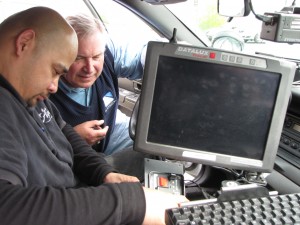
With 64 square miles and 200 miles of road, the town of Wallkill, with its booming “medical mile” and growing retail areas, is adding new technology to allow its vehicles and trucks perform more efficiently and its police to patrol the town more effectively: GPS.
Town supervisor John Ward is stepping down after 10 years of leading the community, but before he goes, he”™s doing something he hopes other municipalities will embrace: installing a GPS on every  municipally owned vehicle ”“ including his own.
The system, which cost the town $27,000 for its 93 vehicles, covers its departments of public works, police and other municipal cars and trucks. It will be allow department heads to monitor routes, idling time, how fast vehicles are traveling and when they are ready for routine maintenance. The town will also pay a monitoring fee for the software program.
“We expect that it will pay for itself within a year by allowing us to track the usage of vehicles more efficiently,” said Ward. “It will allow us to better schedule routes, particularly with our police force, to allow them to patrol the town more effectively. With the highway department, in some cases, it might be a better use of fuel to leave the trucks at the location they are working in overnight, if it is a secure area. It will also tell us if vehicles are going over the speed limit. The overall goal is better scheduling and coordination.”
Wallkill hired Tracking Systems, Inc. to install the GPS system and the software needed to monitor the fleet. Owner Bob Glemming, whose company is based in Montgomery is an authorized distributor for Vehicle Path, says a “geo-fence” around the town”™s borders will help the municipality streamline deliveries and cut down on redundancy of services.
“Department heads know where their trucks and cars are, what they are doing and where they are going,” said said Glemming. “The data is secure ”“ no one can change it. It will help the municipality create routing efficiency, which saves wear and tear on vehicles as well as expenditures for fuel, which is skyrocketing.” In addition to department heads, the supervisor and town board have access to the tracking data.
For Tracking Systems”™ non-municipal customers, “some need extra services, like monitoring vehicle temperature. GPS systems work on ”˜real time.”™ One of our Boar”™s Head distributor”™s temperature controls broke down, and the system picked up on it immediately. It saved the owner from losing $35,000 of perishables because they were notified immediately the climate control in the delivery truck had malfunctioned.”
Glemming, who went to college to become a medical technician, only to be told he needed experience to get a job, got a programming job to pay the bills instead and has been a certified computer devotee ever since. He and his wife, Karen, president of the company, started Tracking Systems Inc. in 2009.
“Our worst nightmare was the economy,” he said. “It took us six months to get our first client. 2010 has proved to be much better and we”™re very glad we hung on; 2009 was a make-or-break year for business, whether it was established or brand new. In my view, GPS is the way to go to businesses with cars and trucks to stay efficient and keep their fleet in top working condition. It helps them coordinate their schedules better and, in turn, saves them money.
“Even as we speak, gas prices are going up,” said Ward. “It is a huge expense for every business and every municipality and is growing. We need to operate as efficiently as possible.”
Assemblyman Marc Molinaro (R-Tivoli), who is running for Dutchess County executive, spoke about the use of GPS for municipalities to increase efficiency and cut out redundancy of services at a recent town hall meeting in Millbrook. “I”™d like to see this initiative expand statewide and to the county level to help us use the technology in a creative and effective way,” he said later. “It”™s there, so why not make the most use of it?”



















